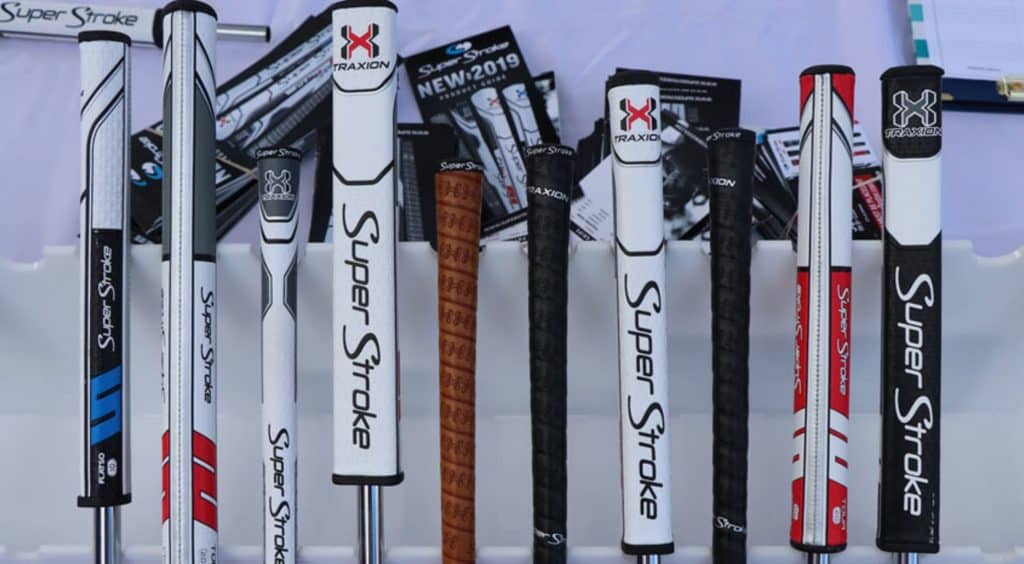Golf grips aren’t the most exciting piece of equipment and it’s unlikely you’ve ever given them much thought – that is, unless they are worn, coming detached from the club, or have generally just seen better days.
I know a lot of guys who have bought new clubs throughout their golfing journey, and I can nearly guarantee that three, five, even 10 years later they are still using the same stock grips that came with their set.
It’s potentially just one of those things people don’t think about, especially since manipulating grip size hasn’t been a massive talking point on the PGA and European Tours until recent years – most of the debate has instead been about driving distance, or clothing (such as whether hoodies should be allowed on-course or not).
Sure, people have their preferences in things like brand and colour, but how many people would make outrageous adjustments to that piece of rubber on the handle? Maybe there’s only a select few who have made that call: the question is, should you be one of them?
As a general rule, you should use thicker golf grips if you have particularly large hands. Pay attention to your glove size, and if you wear a large or extra-large glove, it might be time to change to a thicker grip.
This isn’t the sole reason why you should explore changing grips, as some people with smaller hands may still fall in love with the chunkier feel but, ultimately, smaller hands will find it harder to wrap around a thick grip comfortably, hence why golfers with tiny mitts may actually want to go thinner than standard sized grips.
In this article, I’ll explain the pros and cons of oversized golf grips to help you make an informed choice.
Table of contents
What is the advantage of oversized golf grips?
The main advantage of an oversized golf grip is feel, especially if you have large hands. Hookers of the golf ball can also see benefits, with a thicker grip straightening out the hands and stopping flipping of the clubface caused by overactive wrists.
Having said this, trial and error is the only real way to determine whether oversized golf grips are for you.
Generally, smaller grips are going to help fight against slicing, but for some they may have the opposite effect.
Golf is a funny game and no one thing will work for everyone.
Larger grips can slow the hands down and lead to less swing speed, and while this may be seen as a negative for some, it could be just what the doctor ordered for others.
If you have plenty of distance and find swinging too hard causes you to strike the ball badly, thicker grips may help bring that tempo back to a more relaxed level.
Another added benefit of larger grips is a tendency to decrease grip pressure.
If you use a smaller grip, you may find it far easier to clutch the club tightly, causing pain in the wrists and tension through the arms.
Any golf pro or scratch golfer will tell you – tension in the golf swing can be a killer.
Larger grips will naturally be harder to grasp tightly and could result in a more relaxed and fluid swing.

Are thicker grips better?
Thicker grips are better if you have larger hands, grip the club too tightly, or have trouble with hooking the ball. Hand size is by far the biggest reason why someone may find a thicker grip better, but it could be worth experimenting with thicker grips if you are a chronic hooker of the golf ball.
As mentioned above, feel and the result a certain-sized grip gives you are the only two factors that really matter, but as a rule, thicker grips will better suit those with larger hands.
Believe it or not, you can also manipulate the weight of golf grips, too, and a rise in weight doesn’t necessarily have to correlate with a thickness increase either.
Take PGA star and major winner Bryson DeChambeau, for example.
Prior to the 2019 Masters, he was using 125-gram ‘jumbo-sized’ grips, renowned for being remarkably thick compared to a standard golf grip.
After an epic 14-hour range session, he promptly changed to a 50-gram version, which is a more ‘normal’ weight for grips.
Despite this, thanks to a new, lightweight compound, he was able to maintain the same grip thickness.
So, next time you go in for a fitting, you might need to flex your math skills – just like DeChambeau – to determine the exact grip weight-to-thickness ratio to take your game to the next level.
What thickness golf grip should I use?
The thickness of golf grip you use should be based upon your hand size, measured by the glove you wear. Medium glove wearers will want a standard grip, while those who wear a large glove will want either a standard or midsize grip. Move to an oversize grip if you wear extra large golf gloves.
If you are a hooker of the golf ball, it may also be worth trying a thicker grip. If you tend to slice the ball, experiment with a thinner grip.
Are thick putter grips better?
Thick putter grips – such as the popular SuperStroke putter grips – aren’t necessarily better than standard grips, but they do have some advantages. Thicker putter grips can help reduce tension in the putting stroke, but this may come at the expense of feel.
Because it is harder to wrap your fingers right around a thicker grip, it makes it more difficult to grasp it overly tight.
They also aid in restricting wrist action, which is something that could alter the clubface alignment from your desired path.
Ideally, the putting stroke with a thicker grip should be centred more through the shoulders than the hands, leading to a far more repeatable action.
Despite this, there are some drawbacks, with many players complaining of a reduced level of feel when using these grips.
In wintry conditions when the greens typically run slower, giving the ball the correct, forceful blow from long range could be harder with an oversized grip.
Ultimately, numbers often speak louder than words, and the percentage of players both professionally and socially who now sport thicker grips is on the rise, so there must be some reason for the craze, even if it is just a mental comfort.
Do pros use thick grips?
Some tour pros do use thick grips on their golf clubs, but it is relatively rare. Many golfers use extra thick SuperStroke grips on their putters, but for drivers, woods and irons, most golfers will use a grip that is appropriate for their hand size.
One exception is Bryson DeChambeau (as mentioned earlier) who uses extremely light, yet extremely thick grips on all of his clubs.
As Peter Finch explains when trialling these grips in the video below, they allow DeChambeau to wield the club more in the palm and avoid undesired rotation which can occur when the club is held more in the fingers.
If weird golf technology fascinates you and you can’t help but give this sort of grip a go, check them out on Amazon.
While experimenting with DeChambeau’s bizarrely large grips is likely going to be a novelty for most players, one thing you should consider, as recommended earlier, is a thick, SuperStroke grip for your putter.
Hordes of pros through to Sunday hackers are making the change, and I have to admit, despite not gaming one, I have liked the feel of SuperStroke grips whenever I have borrowed my mate’s putter or experimented with them in the golf store.
If you are genuinely considering making a change, check out the SuperStroke putter grip on Amazon.
Final message
So many of us use stock-standard golf clubs without giving much thought beyond what style or brand we like, and whether or not they performed well in the golf shop.
However, if you have rather large or small hands, a standard grip could be hindering your game.
A consistent miss to the left or right could be remedied by a thicker or thinner grip, not to mention an extra tight putting grasp could be relaxed by a SuperStroke grip.
While conversations about the thickness of your golf grips are unlikely to inspire your playing partners when walking to the next tee, if thicker golf grips have taken Bryson Dechambeau to a US Open championship victory, maybe they can propel you to Sunday competition glory, too.
- TaylorMade SIM2 Max Driver vs M4 Driver: Worth it in 2024? - April 15, 2024
- 3 Ways to Win the Mental Game with the Bridgestone Mindset Golf Ball - March 29, 2024
- TaylorMade SIM Max & SIM2 Max Drivers: Are they Still Relevant in 2024? - March 9, 2024


